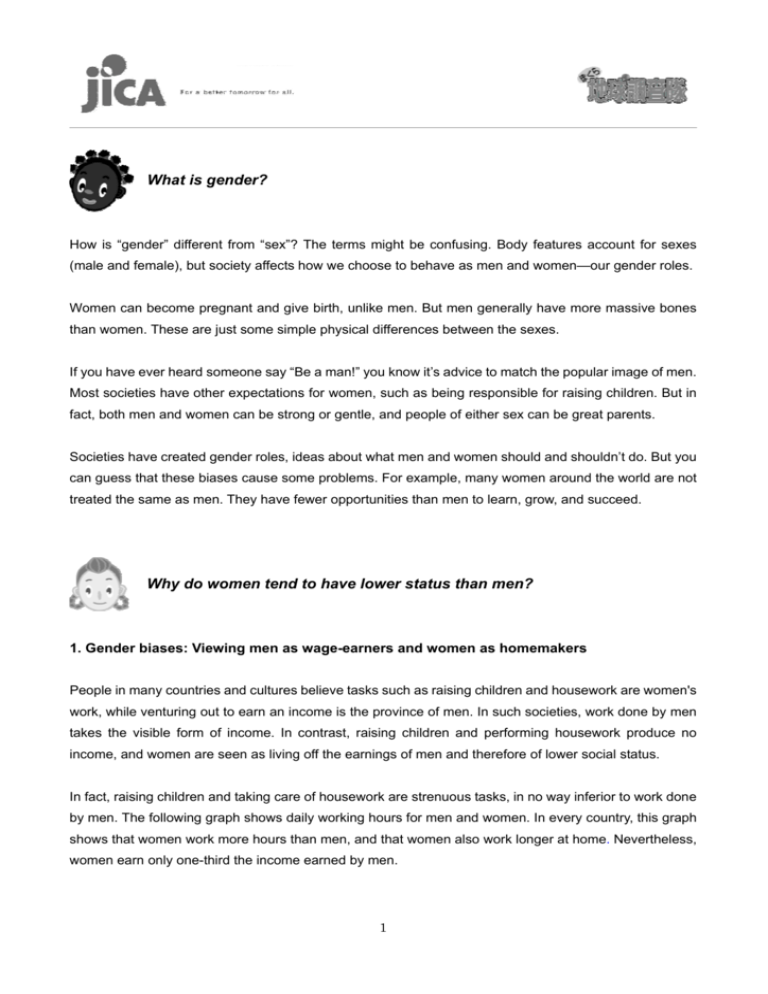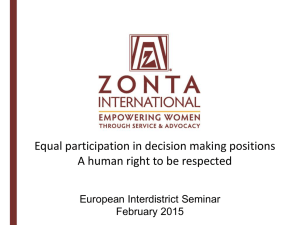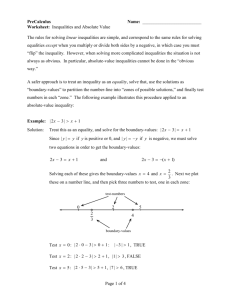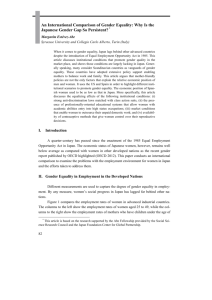What is gender? Why do women tend to have lower status
advertisement

What is gender? How is “gender” different from “sex”? The terms might be confusing. Body features account for sexes (male and female), but society affects how we choose to behave as men and women—our gender roles. Women can become pregnant and give birth, unlike men. But men generally have more massive bones than women. These are just some simple physical differences between the sexes. If you have ever heard someone say “Be a man!” you know it’s advice to match the popular image of men. Most societies have other expectations for women, such as being responsible for raising children. But in fact, both men and women can be strong or gentle, and people of either sex can be great parents. Societies have created gender roles, ideas about what men and women should and shouldn’t do. But you can guess that these biases cause some problems. For example, many women around the world are not treated the same as men. They have fewer opportunities than men to learn, grow, and succeed. Why do women tend to have lower status than men? 1. Gender biases: Viewing men as wage-earners and women as homemakers People in many countries and cultures believe tasks such as raising children and housework are women's work, while venturing out to earn an income is the province of men. In such societies, work done by men takes the visible form of income. In contrast, raising children and performing housework produce no income, and women are seen as living off the earnings of men and therefore of lower social status. In fact, raising children and taking care of housework are strenuous tasks, in no way inferior to work done by men. The following graph shows daily working hours for men and women. In every country, this graph shows that women work more hours than men, and that women also work longer at home. Nevertheless, women earn only one-third the income earned by men. 1 ■Daily hours worked by men and women ※Non-labor-market refers to work done at home – that is, housework and helping with the work of the household. 2. Fewer educational opportunities for women The right to an education, a key to social and economical independence, is a fundamental human right. Education opens the doors to a vast range of information and social services. However, there are many women with less opportunities for education in the whole world. Two-thirds of the approximately 880 million illiterate adults in the world are women. And two-thirds of the approximately 113 million children who are unable to go to school are girls. Why do women have less access to educational opportunities? Many people around the world living in poverty tend to lack the financial resources needed to educate all the children in a household. The result is to encourage education for boys, who have the potential to earn higher incomes, while girls, who are not expected to earn an income, are made to work at home from childhood, doing housework or farm work. Imagine being unable to read; imagine venturing out into society lacking even the most basic education. Imagine the uncertainties and near-insurmountable difficulties. In poor countries, some women are unable to administer medicine to their children because they can't read the instructions. 2 3. Fewer opportunities for women to participate in important community assemblies Certain cultures or traditions do not permit woman to participate in important community meetings. Some countries do not even permit woman to vote. Such measures ensure that women have no means to express their views or needs, creating a vicious cycle that results in even lower status for women. What problems result from gender inequality? When women have restricted opportunities to express their views and needs, they are often are forced to live with major inconveniences, without recourse to social infrastructures. Let’s take the example of water, a fundamental requirement of life. In many countries the task of fetching water is a duty assigned to women, to which women devote countless hours. Water shortages caused by global deterioration of the environment are placing ever-increasing burdens on these women. Lack of education for women also has implications for the health of mothers and children. Women are often left without the knowledge needed to fulfill their roles as child-bearers. Medical and health services are inadequate, or presented in a way inadequate to the needs of women, which men can even imagine, endanger their children’s lives and also of their own. Such problems could be resolved if the women who depend on such services were given the opportunity to express their needs, and if their views on such issues were heeded by men. In their wider implications, gender equality issues transcend gender. Establishing gender equality would not only create healthier, safer and more comfortable lives for women, but for all of society. 3 A story from a Japan Overseas Cooperation Volunteer For work done in developing countries, “gender” can have major unanticipated effects. For example, we tried introducing new crops to raise the income in a certain village. We called the farmers, and the men of the village quickly assembled. We explained how to go about planting and cultivating the seedlings. We were confident the new crops would succeed, because the men listened with such keen interest. But something went wrong. The results fell short of what we'd expected. Why didn't the plan work? Observing the village carefully, we realized that cultivating fields was considered to be as men's work, while sowing seeds and nurturing seedlings and plants to harvest were left to women. If we fail to research the role of women, who play such a vital role in cultivating the crops, the project may fail, despite of all the efforts. Nevertheless, it can be quite difficult to ask women to participate in training sessions when traditions forbid women to venture out into public. Gender inequality in developed nations The chart below shows levels of equality between men and women in terms of three basic categories of rights: political and legal rights; social and economic rights; and rights associated with marriage and divorce. The closer the index to 4, the greater the equality between men and women. Even in OECD (Organization for Economic Cooperation and Development) nations, complete gender equality clearly remains an unachieved goal. ■Index of gender equality Index showing degree of equality between the sexes from the perspective of rights. The closer to 4, the higher the equality. 4 Japan, too, has its gender inequality issues. The graph shown below indicates far more parents of boys want their children to go to university than parents of girls. ■ Expected level of schooling for children Among developed nations, Japan has a wider-than-average wage gap between men and women. ■ International comparison of wage gap between men and women (Males = 100) [ Reference sources ] Japan: Ministry of Health, Labor and Welfare "Basic Survey on Wage Structure" (2001) USA: Department of Labor "Employment and Earnings" (2001) UK, Germany, France: ILO "Year Book of Labor Statistics" (2000) (Note) Japan: Monthly wages (regular salary). Full-time workers. USA: Weekly wages for workers older than 16. Full-time. UK: Hourly wages. Adult, full-time workers. Germany: Time wage. Excludes the following sectors: wholesale, retail, restaurant, and hotel businesses; transport, warehousing, and communications; finance, insurance, real estate and outsourcing services; and regional, social, and individual services. France: Time wage. Excluding the following sectors: mining and quarrying; power, gas, and water industries; civil service; housekeeping services. (Source) "Report of the research group on the gender wage gap issue" (November 2002, Ministry of Health, Labor and Welfare) 5 Overcoming the gender inequality. Gender roles have developed over centuries in every society. We're often unaware to what degree we've internalized gender notions. To the girl who says, "I want to play little league baseball," why do we reply, " Try something else"? To the boy who says, "I want to work as a kindergarten teacher," why do we say, "Childcare is for women"? Why don’t change your mind? Each of us should be very sensitive to our own gender biases we are unconscious of, to make broader choice for everyone. 6











